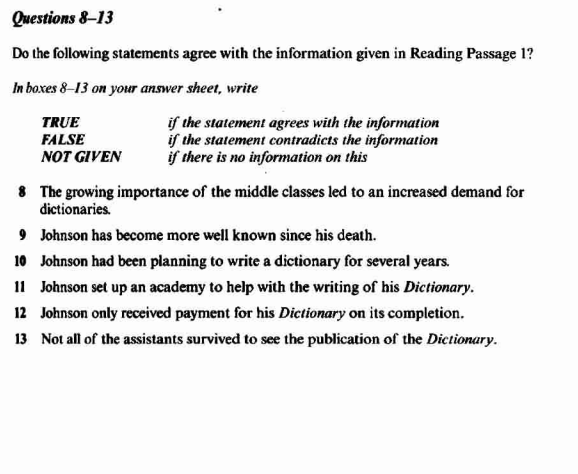剑桥雅思5:Test1雅思阅读PASSAGE 1真题+答案+解析
发布时间:2020-09-10 关键词:剑桥雅思5:Test1雅思阅读PASSAGE 1真题+答案+解析剑桥雅思5:Test1雅思阅读PASSAGE 1真题
READING PASSAGE 1
You should spend about 20 minutes on Questions 1-13, which are based on Reading Pussage 1 below:
Johnson 's Dictionary
For the century before Johnson's Dictjonary was published in 1775, there had been concern about the state of theEnglish language. There was no standardway of speaking or writing and no agreement as to the best way of bringingsome order to the chaos of English spelling. Dr Johnson provided the solution.There had, of course, been dictionaries inthe past, the first af these being a littlebook of some 120 pages, compiled by acertain Robert Cawdray, published in 1604under the title A Table Alphabeticall 'of hardusuall English wordes'. Like the various dictionaries that came after it during theseventeenth century, Cawdray's tended tocancentrate on 'scholarly' words; one function of the dictionary was to enable itsstudent to convey an impression of finelearning,Beyond the practical need to make orderout of chaos, the rise of dictionaries isassociated with the rise of the Englishmiddle class, who were anxious to defineand circumscribe the various worlds toconquer- lexical as well as social andcommercial. It is highly appropriate thatDr Samuel Johnson, the very model of aneighteenth-century literary man, as famousin his own time as in ours, should have published his Dictionary at the very beginning of the heyday of the mddledass.johnson was a poet and critic who raisedcommon sense to the heights of genius.His approach to the problems that hadworried writers throughout the late seven teenth and early eighteenth centurieswas intensely practical. Up until his time,the task of producing a dictionary on sucha large scale had seemed impossible without the establishment of an academyto make decisions about night and wrongusage. Johnson decided he did not needan academy to settle arguments aboutlanguage; he would write a dictionary himself, and he would do it single-handed.Johnson signed the contract for the Dictionary with the bookseller RobertDosley at a breakfast held at the GoldenAnchor Inn near Holbormn Bar on 18 June1764.He was to be paid E I,575 in instalments, and from this he took moneyto rent 17 Gough Square, in which he setup his 'dictionary workshop".James Boswell, his biographer; describedthe garret where Johnson worked as fittedup like a counting house' with a long deskrunning down the middle at which thecopying clerks would work standing up.
Johnson himself was stationed on a ricketychair at an 'old crazy deal table' surrounded by a chaos of borrowed books. He was also helped by six assistants, two of whom died whilst theDictionary was still in preparation.The work was immense; filing about eightylarge notebooks (and without a library tohand), Johnson wrote the definitions ofover 40,000 words, and llustrated theirmany meanings with some 114,000 quotations drawn from English writing onevery subject, from the Elizabethans to hisown time, He did not expect to achievecompiete originality Working to a deadline,he had to draw on the best of all previousdictionaries, and to make his work one ofheroic synthesis. In fact, it was very muchmore. Unlike his predecessors, Johnsontreated English very practically, as a livinglanguage, with many diferent shades ofmeaning. He adopted his definitions on theprinciple of English common law-according to precedent After its publication, his Dictionary was not seriouslyrvalled for over a century.After many vissitudes the Dictionary wasinally published on 15 April 1775. lt wasinstantly recognised as a landmark throughout Europe. 'This very noble work;'wrote the leading ltalian lexicographer.' willbe a perpetual monument of Fame to the Author, an Honour to his own Country inparticular, and a general Benefit to therepublic of Letters throughout Europe.'The fact that Johnson had taken on theAcademies of Europe and matched them(everyone knew that forty French academics had taken forty years to produce the first French national dictionary) was cause for much Englishcelebration.Johnson had worked for nine years, 'withitte assistance of the learned, and withoutany patronage of the great; not in the softobscurities of retirement, or under theshelter of academic bowers, but amidstinconvenience and distraction, in sicknessand in sorrow'. For all its faults and eccentricities his two-volume work is amasterpiece and a landmark, in his ownwords, 'etting the orthography, displayingthe analogy. regulating the structures, andascertaining the significations of Englishwords'. It is the cornerstone of StandardEnglish, an achievement which, in JamesBoswell's words, 'conferred stability on thelanguage of his country'.The Dictionary, together with his otherwriting, made Johnson famous and so wellesteemed that his friends were able toprevail upon King George 1l to offer him apension. From then on, he was to becomethe Johnson of folkdore.
读文1
你应该花大约20分钟来回答第1-13个问题,这些问题是根据下面的“Pussage 1”阅读提出的:
约翰逊词典
在1775年约翰逊的《口述书》出版之前的一个世纪里,人们一直在关注英语语言的现状。在口语和写作方面没有统一的标准,在如何使混乱的英语拼写有秩序方面也没有统一的意见。约翰逊博士提供了解决办法。当然,过去也有字典。最早的是一本约有120页的小本子,由唐·罗伯特·考德雷编撰,于1604年出版,书名为《难用英语单词的字母顺序表》。就像在它之后出现在19世纪的各种词典一样,考德雷倾向于取消“学术性”词汇;字典的功能之一就是使itsstudent传达finelearning的印象,超出了实际需要orderout混乱,字典的崛起isassociated Englishmiddle阶级的崛起,他们焦虑的定义和限制各种世界征服——词汇以及社会andcommercial。塞缪尔·约翰逊博士是十八世纪文学家的楷模,在他那个时代和我们那个时代一样有名,他在这一团糟的时代刚开始的时候就出版了他的词典,这是恰当的。约翰逊是一位诗人和评论家,他把常识到天才的高度。他对那些使无数作家困扰了整个十七世纪末和十八世纪初的问题所采取的方法是极其实际的。在他那个时代,如果没有建立一个对夜间和错误用法作出决定的学术机构,要编纂如此大规模的词典似乎是不可能的。约翰逊决定他不需要学院来解决语言争论;他要自己写一本词典,而且他要一个人写。1764年6月18日,约翰逊与书商罗伯特·多斯利(RobertDosley)在霍博尔姆酒吧(Holbormn Bar)附近的金锚酒店(GoldenAnchor Inn)的一次早餐会上签署了这本词典的合同。他用这笔钱租了高夫广场17号,在那里他建立了自己的“字典作坊”。詹姆斯·博斯韦尔,他的传记作者;他描述了约翰逊工作的阁楼,里面装修得像一个计数室,中间有一个长长的桌子,办公室职员可以站着工作。
约翰逊本人则坐在一张摇摇晃晃的椅子上,旁边是一张“疯狂的旧松木桌旁”,周围是一堆乱七八糟的借来的书。他还得到了六名助手的帮助,其中两名助手在词典编纂过程中死亡。工作是艰巨的;提交关于eightylarge笔记本(没有一个图书馆tohand),约翰逊写了40000字,定义移动,说明theirmany含义有114000报价来自英语写作任何主题,从伊丽莎白自己的时间,他不希望achievecompiete创意工作的最后期限,他不得不利用的previousdictionaries,并使他的作品一个ofheroic合成。事实上,它远不止这些。与他的前任不同,约翰逊对待英语实际,作为一种活生生的语言,有许多不同的含义。他根据英国习惯法的原则采用了自己的定义,根据出版后的先例,他的词典在一个多世纪里都没有被认真使用过。经过访问,这本字典终于在1775年4月15日出版了。它立刻被认为是整个欧洲的地标。“这是一部崇高的著作,”一位杰出的意大利词典编纂者写道。对作者来说,这将是一座的名誉丰碑,尤其是对他自己的来说,更是一种荣耀,对整个欧洲的文学事业也将是一种普遍的利益。约翰逊与欧洲各国的学术机构较量并与之匹敌(每个人都知道,40位法国学者花了40年的时间才写出了部法国词典),这一事实引起了英国人的极大庆祝。约翰逊工作了九年,“没有学识渊博的人的帮助,也没有大人物的任何赞助;不是在退休的时候,也不是在学术的庇护下,而是在方便和分心的时候,在生病和悲伤的时候。尽管有种种缺点和怪癖,他那两卷本的著作仍然是一部杰作和一个里程碑,用他自己的话来说,就是“纠正正字法,展示类比”。规范英语单词的结构,确定单词的意义。这是标准英语的基石,用詹姆斯·博斯威尔的话说,这一成就“赋予了他的的语言稳定性”。这本字典和他的其他著作使约翰逊出名,他的朋友们都能向乔治国王请求赔款。从那时起,他就成为了福克斯多雷的约翰逊。


剑桥雅思5:Test1雅思阅读PASSAGE 1真题答案解析





